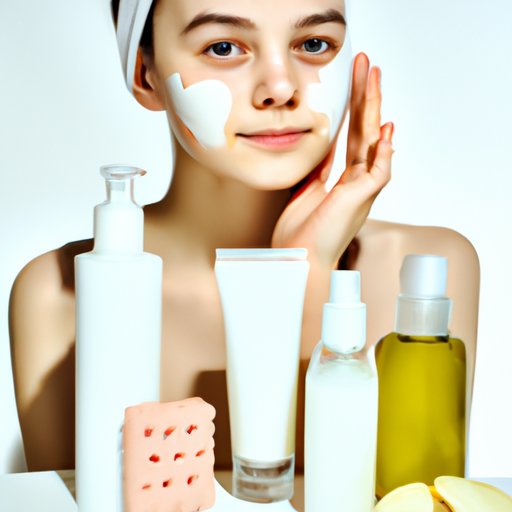Introduction
Acne scars are the result of inflammation caused by cystic acne. They can appear as deep pits or indentations in the skin, or as raised, red scars. While many people experience some degree of acne scarring, it is possible to reduce their appearance or even prevent them altogether. In this article, we’ll discuss various tips and strategies for preventing acne scars.
Use Gentle Cleansers
Using gentle cleansers is an important part of preventing acne scars. Harsh cleansers can strip the skin of its natural oil and moisture, leading to increased dryness, irritation, and breakouts. To keep your skin healthy and clear, look for non-comedogenic cleansers that are free of fragrances, dyes, and other potential irritants. There are a variety of gentle cleansers available, including gel cleansers, milk cleansers, and cream cleansers.
When cleansing your face, use lukewarm water and be sure to massage the cleanser into your skin in a gentle, circular motion. Avoid scrubbing or over-washing, as this can lead to further irritation and dryness. Finally, be sure to rinse thoroughly and pat your skin dry with a soft towel.

Avoid Picking or Popping Pimples
Picking or popping pimples can cause further damage to the skin, leading to more inflammation and an increased risk of developing acne scars. If you have an urge to pick at a pimple, try to resist it and consider other alternatives. For example, applying a warm compress to the area can help draw out the oil and pus. You can also apply a spot treatment containing salicylic acid, benzoyl peroxide, or tea tree oil.
Wear Sunscreen Daily
Sun exposure can make existing acne scars worse, as well as darken new ones. To protect your skin from sun damage, it’s important to wear sunscreen every day. When choosing a sunscreen, look for one that is broad spectrum, meaning it blocks both UVA and UVB rays, and has an SPF of 30 or higher. Be sure to apply sunscreen generously and reapply every two hours if you’re spending time outdoors.

Use Topical Treatments like Retinoids
Topical treatments, such as retinoids, can help reduce the appearance of acne scars. Retinoids are derived from vitamin A and work by exfoliating the skin and increasing cell turnover rate. This can help reduce the appearance of scars and give skin a smoother, more even texture.
Retinoids come in several forms, including creams, gels, and lotions. It’s important to be aware that retinoids can cause side effects such as redness, dryness, and irritation. To minimize these side effects, start by applying a small amount of the product every other night and gradually increase usage as your skin becomes accustomed to it.
Eat a Healthy, Balanced Diet
Eating a healthy, balanced diet can help reduce inflammation in the body and minimize the risk of developing acne scars. Foods that are rich in antioxidants, such as berries, leafy greens, and nuts, can help reduce oxidative stress in the body. Omega-3 fatty acids, which are found in foods like salmon and flaxseed, can also help reduce inflammation. Additionally, getting adequate amounts of vitamins A and C can help promote healthy skin.
Keep Your Skin Hydrated with Moisturizers
Keeping your skin hydrated is essential for preventing acne scars. Look for moisturizers that contain hyaluronic acid, ceramides, or glycerin as they can help lock in moisture and prevent dehydration. When applying moisturizer, be sure to use a light touch and avoid rubbing too hard as this can further irritate the skin.
Conclusion
In summary, there are many steps you can take to prevent acne scars, such as using gentle cleansers, avoiding picking or popping pimples, wearing sunscreen daily, using topical treatments like retinoids, eating a healthy, balanced diet, and keeping your skin hydrated with moisturizers. By following these tips, you can significantly reduce your risk of developing acne scars.


